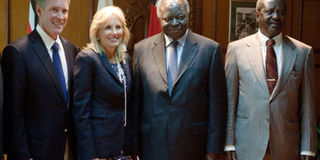US hand in embracing genetic products

President Mwai Kibaki with Dr Biden, US Senator Bill Frist and Prime Minister Raila Odinga at Harambee House. Photo/PPS
Kenya has finally joined a growing number of countries in the world which have allowed he importation, growing and commercialisation of genetically modified organisms.
On Friday August 12, the National Biosafety Authority (NBA) gazetted the final regulations that allow for the commercialisation of genetically modified organism in Kenya. (Read: Agency ‘lacks power to vet GM imports’)
This means that on application to the agency, one can import such products for commercial use, and soon, modified seeds and planting materials will be available to Kenyan farmers.
Although NBA chairman Prof Miriam Kinyua does not see the latter happening overnight, she predicts that in two to three years, the technologies will be in the hands of farmers.
Some details like labelling of commercial products are still being worked out, according to the chair, but will be out soon.
However the Ministry of Agriculture and other government organisations may still have to burn the midnight oil over how small scale farmers will be involved in planting GMO maize.
Offending neighbour
The agencies will have to work out a system that allows an accepting farmer to grow GM maize, for example, without offending the neighbour who is opposed to the technology.
Maize poses an extra challenge because of the possibility of pollen flow contaminating neighbouring fields.
Despite these procedural matters, Kenya’s actions are a cause for celebration in the US and among its multinational seed companies.
About the time the NBA was publishing the final guidelines in Nairobi, elsewhere in Washington, US Secretary of State Mrs Hillary Clinton was toasting scientists at the Kenya Agricultural Research Institute (Kari) for what she said were their gallant efforts to feed the country.
In a speech in Washington, a day before the publication of the guidelines, Mrs Clinton said she was “very impressed” by the work of scientists at Kari, which she described as “top-notch facility”.
Kari researchers “are cultivating crops that can thrive in drought and are enriched with essential nutrients,” she told an audience at a food-focused think tank. “These breakthroughs have already saved lives and I’m sure will save many more in the future.”
While noting that the Kenya government was moving in the right direction, she nudged it to do more and open up free trade in grain imports and exports and the “need to welcome new technologies to bolster drought tolerance, disease resistance and crop yields”.
The rare praise came a few days after a high level American delegation which included Dr Jill Biden, wife of the country’s Vice President Joe Biden, had toured Kari in a highly secretive event which was completely closed to local media.
The delegation which also met with the principals Mwai Kibaki and Raila Odinga also had a session with the minister for Agriculture Sally Kosgey where they discussed long-term food security programmes.
Kari has several ongoing biotechnology research programmes with major US multinationals such seed giant Monsanto and others funded Melinda and Bill Gates Foundation.
In Kenya, Monsanto is involved in field trials of genetically modified cotton and virus resistant cassava.
Several other initiatives fronted by Kari but mainly funded by foreigners are going on in GM maize.
The development, debating and final approval of the Biosafety Act 2009 attracted intense scrutiny and participation of US authorities at every twist and turn.
Americans were the main force behind the speedy enactment of a law that allowed the introduction of genetically modified crops and products into the country, a diplomatic cable released by whistle-blowing website WikiLeaks revealed earlier this year.
A cable sent to the American Secretary of State in March 2009, by former US ambassador Michael Ranneberger, just a few days after President Kibaki had signed the Biosafety Act 2009 into law, tells of how use of financial and technical support helped to speed up and overcome opposition to the Bill.
The ambassador’s cable, which was to be widely distributed in Washington, to among others the Department of Commerce, Treasury, Agriculture and agencies responsible for science and technology, tells of how a hesitant Parliament was finally overcome.
WikiLeaks cable
The WikiLeaks cable explained how a USaid-funded programme had created linkages among key national institutions used to lobby for the Bill among policy makers, MPs and government agencies.
“A USAid-funded Programme for Biosafety Systems created linkages among key national institutions, building support for the Bill among policy makers and biosafety regulatory agencies,” wrote the envoy.
The programme, he said, also provided technical support to confined field trials of genetically modified cotton and corn.
Seeds in these programmes are provided by American multinationals.
Ranneberger tells how an international conference in Nairobi, All Africa Congress on Biotechnology in 2008, by African Biotechnology Stakeholders Forum, galvanised local proponents.
This was most likely the biggest biotechnology conference ever in Africa, attracting top representatives from 39 countries and the Who is Who in Kenyan agriculture.
According to a conference report, the leading international organisations and funders were USaid, US Department of Agriculture and giant American GM seed producer, Monsanto.
The meeting was opened by then Agriculture minister William Ruto, who explained: “I believe the best way to remove poverty and food insecurity is to adopt the adequate technology. If there is no proof of harm from GMOs, we should adopt them because they have a scientific backing.”
Mr Ruto said the proposed legislation on biosafety would be re-introduced in Parliament in two months.
After that, the Bill progressed with what seemed to be satisfactory speed for the Americans.




